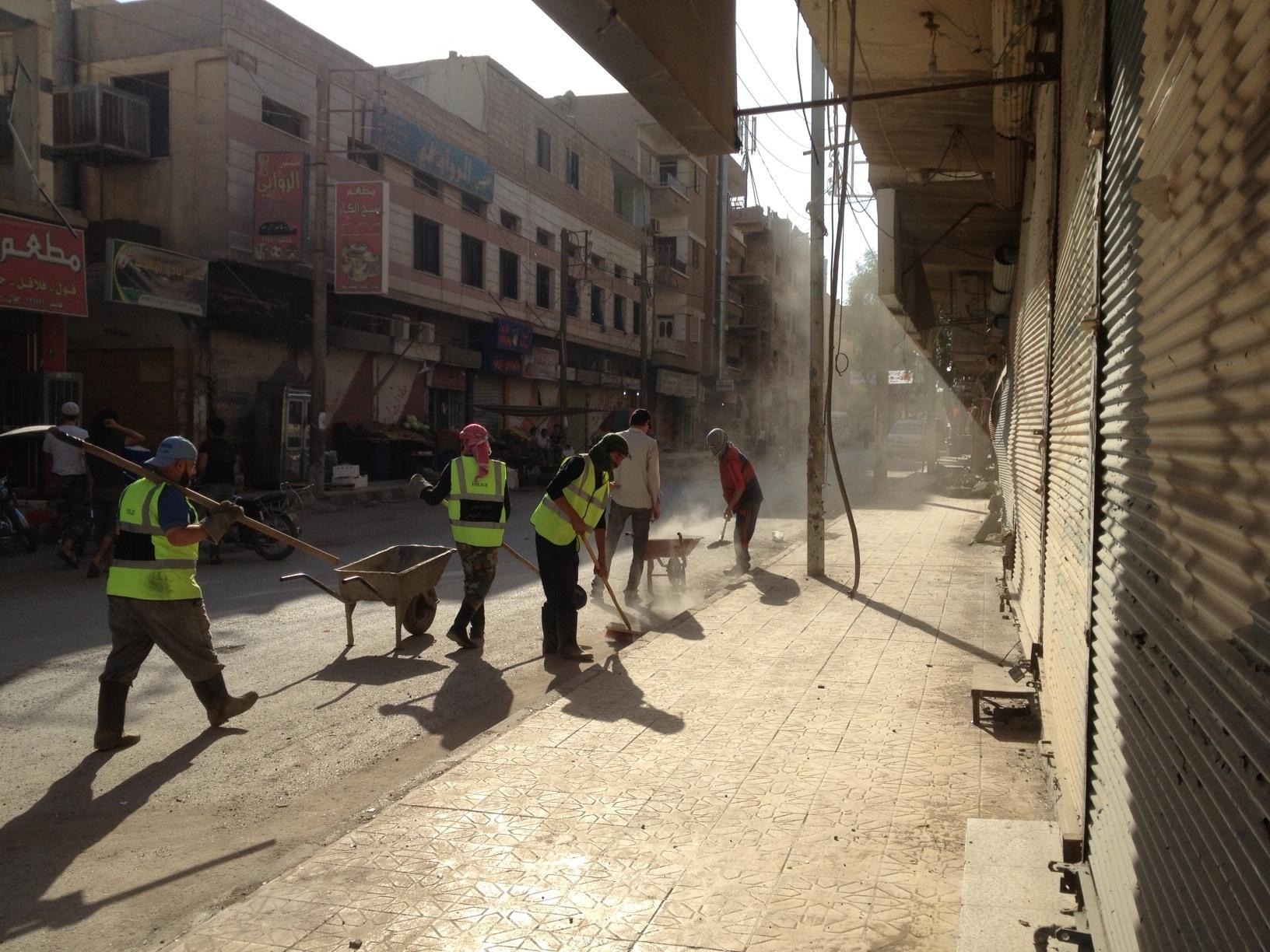Residents of Syrian city of Deir Ezzor live life under siege
A cleaning squad collects debris from the day’s daily life and daily violence in Deir Ezzor, Syria, as the country’s civil war rages on. (Photo by Marine Olivesi.)
They call it “the bridge of death.” And it’s the only way in and out of the city of Deir Ezzor.
Over the past year, civilians and fighters were crossing the Euphrates by boat. But recently, the river banks came under shelling and now, even the so-called “bridge of death” is considered safer.
Abu Ayoub is the commander of one of the main Free Syrian Army brigades in Deir Ezzor. He phones in to see if the regime’s snipers have targeted the bridge this morning. It’s been quiet so far, and he gets the green light to cross.
“Yalla, let’s go,” he said.
Approaching the bridge, the commander is behind the wheel and the car is speeding through the bridge to avoid any possible sniper fire. It’s quite the nerve-racking experience.
Abu Ayoub hits the brakes a little too hard … the car spins 180 degrees before landing in a sand hill. The men quickly inspect the car and drive on.
Everywhere you look in Deir Ezzor it’s the same sight of sheer destruction. There’s not a single building that hasn’t been hit by some kind of artillery, gunfire or mortar shells.
The first people we see are a dozen men with shovels and bright yellow jackets. These locals fight the regime of Bashar al-Assad at night. During the day, they clean up the ravages of war.
It’s a daunting task, but an urgent one. Ahmed Al Yusuf from the local council says people are getting sick because of the trash. They worry especially about insects and the diseases they bring.
As he speaks, more shelling — more work for later.
The cleaning squad collects the rubble and trash, but they can’t take it out of town. That would mean crossing the bridge, and trash isn’t worth the risk.
Walking away from the main street, birds chirp, kids run after a soccer ball, then, a half dozen rockets whiz overhead and explode in the distance.
Strikingly, there’s no reaction from anyone. No one is running for cover. A couple of kids continue riding their bicycles. A tailor in a nearby shop continues sewing.
The people say they’re just so used to the shelling by now. Some days several hundred land inside the town. After a year of this, people say they’re just immune to any sense of fear.
Others just say they’ll die when they die. There’s nothing to be done. So life goes on, no matter what.
School’s open a few hours in the afternoon, falafel vendors sell hundreds of deep fried balls every day and people still get married. At a wedding party, for women only, there are about 50 people in attendance. The younger ones let their hair down and belly dance.
The bride glitters with sparkling powder. She’s getting married to a fighter from Jabhat al-Nusra, the Islamic brigade affiliated with al-Qaeda. Her friend says he could well die tomorrow, but the choice is between this or living like they’re dead already. So tonight, they all put on make-up and tight dresses. But the anger stirs beneath the surface.
“All the world sees what’s happening here, but they don’t speak,” she said. “Everyone, everyone see what’s happened here, everyone, but close their eyes.”
Like elsewhere in Syria, the revolution has turned here into a war of attrition. Frontlines cut through the city, neighborhoods, sometimes even homes; but overall, enemy lines haven’t moved in months.
Abu Amar and Ahmed, two brothers and fighters, blame Western countries for the stalemate. Ahmed says America’s inaction has squeezed moderates out of power here.
“When you find yourself alone, anyone try to help you, bad, good, you will agree to that. No problem. Anyone help you, no problem. How much he’s bad, no problem. Just help you to fight this system. Anyone,” he warned, explaining the tilt toward Islamic militants.
It’s a point made heard over and over again in Deir Ezzor. People here spend hours every day rehashing the turn of events, with conversations filled with “what ifs” and “if only.”
In a street close-by, three men play an old traditional song. And for a few minutes, their tune fills up the night, puts off the nattering, and covers the sound of war.
